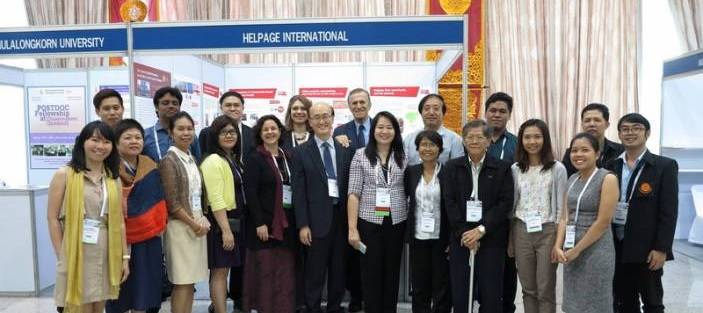HelpAge International plays a key role in the East Asia-Pacific region gathering and sharing knowledge to support a wider movement aiming to improve the wellbeing of older people.
From 19-22 October, we advanced this agenda through the 10th International Association of Gerontology and Geriatrics (IAGG) Asia/Oceania 2015 Congress in Chiang Mai, Thailand, which we co-hosted.
We gathered 1,115 participants from 47 countries around the world to present ageing research under the theme “healthy ageing beyond frontiers”.

IAGG provided a rich breadth and depth of learning for all of us interested in older people. In any time slot, there were three to four meetings with several presenters in each, as well as three to four oral presentation sessions with around 10 presenters. Every day there were a different set of 140 posters up in the hall to peruse as well.
The vast majority of participants were academics, and presentations fell within the categories of clinical science, behavioural and social science, biological science, and policy planning and practice.
I personally heard presentations on proactive investment in long-term care systems, roles of grandparents from the perspective of adult children and grandparents themselves, and was particularly intrigued by a presentation on the effects of melatonin-laced water on prevention of neurocognitive decline in rats and mice.
Of particular relevance to HelpAge’s work in East Asia-Pacific were the discussions on developing holistic person-centred health and care approaches. The World Health Organization presented the recently released landmark World Report on Health and Ageing and other healthy ageing initiatives in the region.
There was an impressive amount of research presented on mental health, cognitive decline, population health, long-term care systems, community health care systems and the like. These reinforced the importance of working with all countries to shift perspectives so that, in five or ten years there is a clear, underlying understanding about person-centred older people’s health and care.
The congress also allowed HelpAge to share with others about what we’ve been learning through our work as a civil society network involved in direct programming, evidence gathering and policy advocacy throughout the region.
We organised meetings on the role of government in social care services, the active role of older people in emergency response and disaster preparedness, and how older people’s associations contribute to health and wellbeing. We also participated in sessions on empowering older people and the value of older people and their contributions.
Through these sessions and our booth, which had posters, videos, and publications on these and other topics, we were able to strongly represent civil society and community-level work in low and lower-middle income countries. This was especially important as the majority of research being done in Asia and shared through this forum is from countries such as Japan, Korea, Australia and Singapore. There is little or no representation from countries like Laos, Cambodia, Myanmar and Vietnam.
Looking forward
In the follow up to the congress, HelpAge will be sharing what was learned through this forum with others in the HelpAge network, helping to bring what we learned to those unable to attend. We will also be drawing from the connections made and strengthened to feed into future collaborations on research, for expert advisors on key topics, and for presenters for future events and conferences.
Find out more:
- Read about our work in East Asia-Pacific.
- Download our poster set on what we do in the region.
